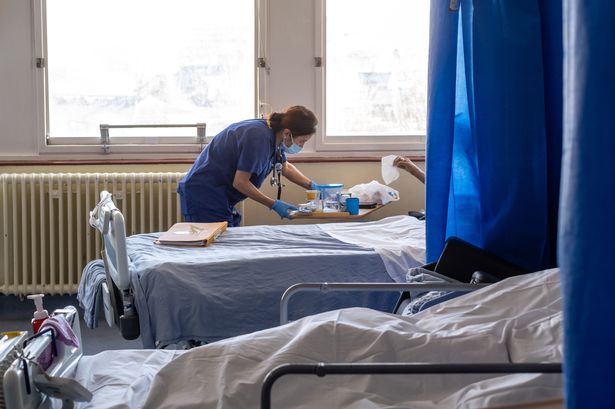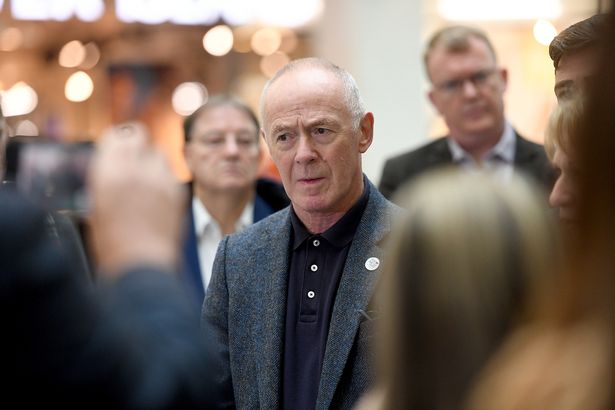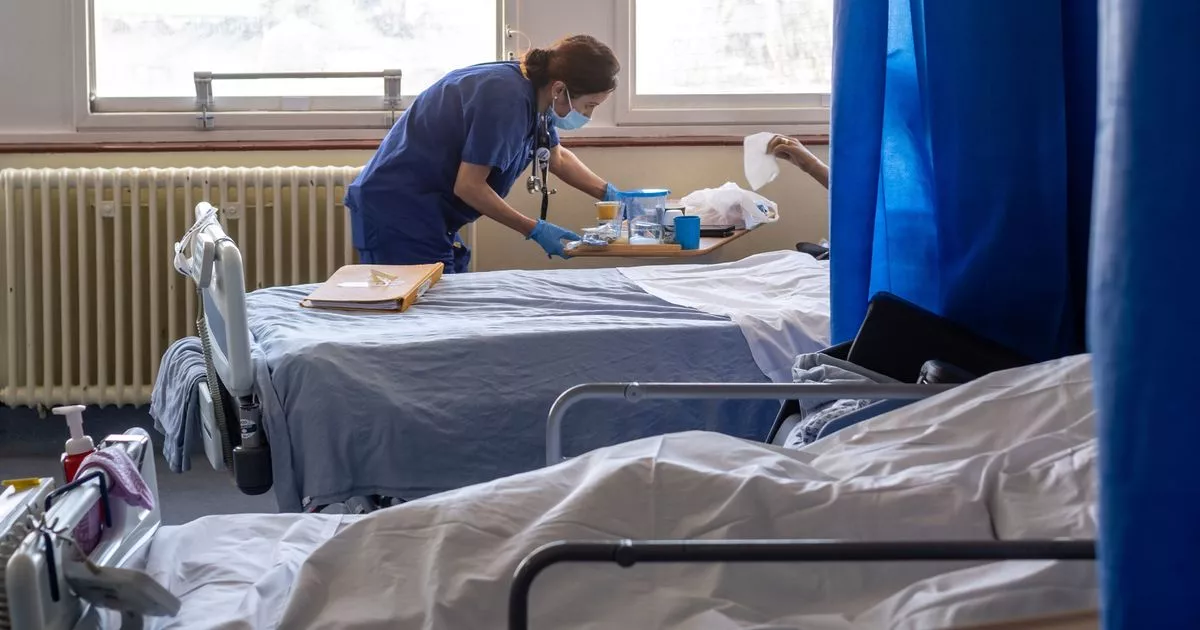‘We have been living in a period of incredible uncertainty, and that has taken a toll on staff’ “It’s really shocking to listen that 600 plus staff members don’t know what’s going to happen next. They have got families and children, directly or indirectly, there are thousands [affected],” say angered councillors(Image: PA)
“It’s really shocking to listen that 600 plus staff members don’t know what’s going to happen next. They have got families and children, directly or indirectly, there are thousands [affected],” say angered councillors(Image: PA)
The 1,600-strong NHS workforce in Greater Manchester is being left with an ‘incredibly uncertain’ future as the government refuses to approve a redundancy scheme.
Some 600 NHS employees in the region are facing redundancy amid deep cuts being demanded by the government. But months after announcing the reforms, national health bosses ‘will not approve’ a government-backed redundancy scheme needed for the huge savings ordered by Westminster.
That means there is still no clarity on if jobs will be lost, which jobs those might be, and when they might be lost – effectively leaving the total 1,600 staff, and their families, with no security.
Earlier this year, NHS Greater Manchester, the region’s oversight body, was told to cut its costs by 39 per cent and save £41 million from its £106m staff budget under the government’s reforms. That equates to 600 jobs, heard Greater Manchester’s Joint Health Scrutiny Committee meeting today (October 14).
Join the Manchester Evening News WhatsApp group HERE
Councillors at the scrutiny committee levelled their concerns at the government about hundreds being left in limbo, admitting the cuts ‘hitting home sounds quite frightening’.
Committee vice-chair and Salford councillor, Irfan Syed, said: “It’s really shocking to listen that 600 plus staff members don’t know what’s going to happen next. They have got families and children, directly or indirectly, there are thousands [affected].
“It should have been the first priority. [Those 600 plus families] don’t know what’s going to happen the next day.”
“It’s not just 600, it’s [all staff facing uncertainty] because nobody knows,” added committee chair and Bury councillor, Elizabeth FitzGerald.
“On a human level, we’re doing our best to create clarity for our colleagues when, actually, we have got a lack of clarity that we’re dealing with,” responded Joanne Street, NHS Greater Manchester’s programme director of NHS reform and transformation.
 Greater Manchester Mayor Andy Burnham has hit out at the lack of clarity for NHS staff(Image: Getty Images)
Greater Manchester Mayor Andy Burnham has hit out at the lack of clarity for NHS staff(Image: Getty Images)
The M.E.N. has reported previous meetings where figures were quoted of 400 jobs at risk out of 1,400 staff employed by NHS Greater Manchester, including human resources staff, finance workers, IT staff, patient-facing nurses, and many people involved in planning, purchasing and monitoring both care in hospitals and in the community.
In today’s scrutiny committee, those figures rose to 600 jobs needing to be cut out of 1,600 running the organisation.
The figures come after the government announced in spring that the country’s 42 regional health boards, responsible for planning and paying for health care services, will have to lose around half of their 25,000 staff.
“We originally anticipated that this reduction in operating costs would be enabled by a redundancy scheme, so that we could reduce operating costs quickly, within this financial year,” Ms Street told the meeting.
“However, at this point, no [regional health board] nationally including ourselves has received approval to launch a redundancy scheme.
“This means that we are having to look at new ways to move to reduce cost over time – that being a longer period of time.”
Even if approval for a redundancy scheme was granted now, the process would take several months before staff would leave the organisation on a compulsory basis, the meeting heard.
“We have been living in a period of incredible uncertainty, and that has taken a toll on staff,” the organisation’s director of communication and engagement, Claire Connor, told the scrutiny meeting.
“I’m sure what they’re keen to know more than anything is, ‘what does this mean for me and my role?’ Unfortunately, we don’t have that information yet…
“We’ve not had a hard no [from the government about a redundancy scheme], it could still go ahead. But it’s very unlikely that we will receive the go ahead to make any redundancies this financial year… maybe on the table again next financial year.
“A hard no might actually be easier to work with, but it comes back to that uncertainty. We’re just waiting with the possibility that we might be given a green light.”
 Sir Richard Leese called the situation ‘Kafka-esque'(Image: Manchester Evening News)
Sir Richard Leese called the situation ‘Kafka-esque'(Image: Manchester Evening News)
In August, Greater Manchester leaders including Greater Manchester Mayor Andy Burnham, railed against the government. They told of how they are stuck in an ‘impossible situation’ as the government ‘will not approve’ plans for a voluntary redundancy scheme.
Chair of the organisation, Sir Richard Leese, said: “We currently find ourselves in a situation that’s almost beyond belief. We’re in a very Kafka-esque situation as an ICB.
“[The cost reductions have ] to be in place by April 1 of next year before the budget provision for all of that is removed and it goes.
“It effectively means, in absolute terms, the only employee of the ICB who can guarantee to still have a post is the chief executive.
“It’s a dreadful position for our staff.”
Sir Richard continued that the region’s NHS wanted to launch a proposed voluntary redundancy scheme in September – but it was hamstrung by the government.
“There is no other realistic way of getting down to that running cost target without a successful voluntary redundancy scheme,” Sir Richard told the board.
“It cannot be done without. We were hoping to agree how we might fund that voluntary redundancy scheme and submit a proposal in the very near future for approval by the DHSC and Treasury.
“We received a letter this week, we have been told in writing, basically, if we submit a scheme it will not be approved at the moment.
“We will continue with the planning process, we will continue to make sure that we are ready.
“But we, effectively, have been told that we have to reduce our staff but we’re told that we will have no device in supporting you in doing that. Which is why I describe the situation as Kafka-esque.
“We currently face an impossible situation.”
Today, the difficulties continued. NHS Greater Manchester will continue to have a near £9bn budget for health care in the region, but will somehow have to dramatically reduce the number of staff with responsibility over that money.
“We’re working out locally and nationally how long it will take us to get to that point, given that we can’t reduce our operating costs quickly through a redundancy scheme,” continued Ms Street.
“We haven’t had it confirmed yet, but it is likely that this will now span over several years. If we were only able to use natural turnover, how quickly people naturally leave the organisation, that would take us five years to [achieve the government-mandated cuts].”
Join our Family WhatsApp group HERE
After the sweeping NHS cuts were announced earlier this year, Health Secretary Wes Streeting was asked by MPs whether he recognised a reported figure that the total cost of redundancy payouts could reach £1bn nationally.
He said that it was too early to know the precise numbers, but that £1bn was not an ‘unreasonable ballpark figure’.
Back in the summer, Mayor Burnham said Greater Manchester will have to make decisions that fit the complexities of a region disproportionately disadvantaged when it comes to serious illnesses and health care funding.
“We will, in the end, do what’s right for us – irrespective in some ways of what filters out from the national level,” he said.
